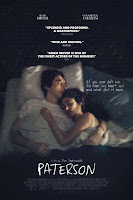And Now, The Backstory…
 |
| Jarmusch, with Carter Logan, at the Sunshine Cinema last night |
During this Q&A, Jarmusch was simply amazing – cool, insightful, respectful about his art, playful about his art, genuine, smart and thankful to all the people who collaborate on his films.
As I’ve noticed at similar events in the business world, however, the audience questions seemed more focused on the observations of the person asking the question. It’s always personal… always “about me!” and not focused on the topic of discussion.
In that spirit, I offer my own "Paterson" backstory that has only a tangential thread to the movie:
I grew up in Totowa, a town bordering Paterson – which is America’s first planned industrial center and still the most populated city in Passaic County.
Despite its local reputation for crime and poverty, I always found Paterson to be a good neighbor… although its neighbors have not always been so faithful.
Two other bordering towns – formerly known as East Paterson and West Paterson – formally changed their names to Elmwood Park (1973) and Woodland Park (2009) – seemingly to avoid any association with Paterson. Notice how these towns cleverly kept their EP and WP initials, so that none of the associated community, municipal or educational logos needed to change.
My first job as a newspaper reporter was in Paterson – and I admit it, I found the city scary enough not to stop at any red lights when driving home after my shift ended in the early morning hours in the early 1980s.
A tough and complex city – unapologetically unlike Totowa or Elmwood Park or Woodland Park -- Paterson has also, over the years, been a haven for musicians, artists and writers… with an astoundingly diverse population and an enchanting incongruity. There are, for example, breathtakingly beautiful renovated homes in the city’s gentrified, historic Eastside Park neighborhood. There’s also a large historic park and waterfall right in the center of town (and this particular setting plays a central role the movie).
But, back to me.This Paterson – the one I grew up with, often love and sometimes fear – is truly a unique place. And Jim Jarmusch (remember him?) is truly a unique director, so please, I urge everyone, SEE THIS MOVIE. It is, as my review (remember that?) states, a gem of a way to look at life for 118 minutes. It’s simply not like anything else. In this day and age, that may be the highest praise you can give anything.
Photo from my visit to Paterson's Great Falls in October 2017
After the movie, my wife Nancy and I went for a drink at trendy Fools Gold on East Houston Street. I definitely didn’t feel like I was cool enough to be there.
Yet, there we were, seated at the end of the bar. I was in a restless and unsettled mood. I was, in fact, the saddest person in a happy barroom.
I sought solace in the always on-point observations of my wife.
“What did you think of the movie?” I asked.
As Nancy spoke, I was looking directly at a reflection of myself sipping a craft beer in the tastefully trashily decorated mirror behind the bar.
“Oh,” she said wistfully, “it was sweet in its own way. But it kind of had its flaws.”
I was still looking in the mirror, so – speaking of everything being about me -- I had to ask:
“You are talking about the movie, right?”







